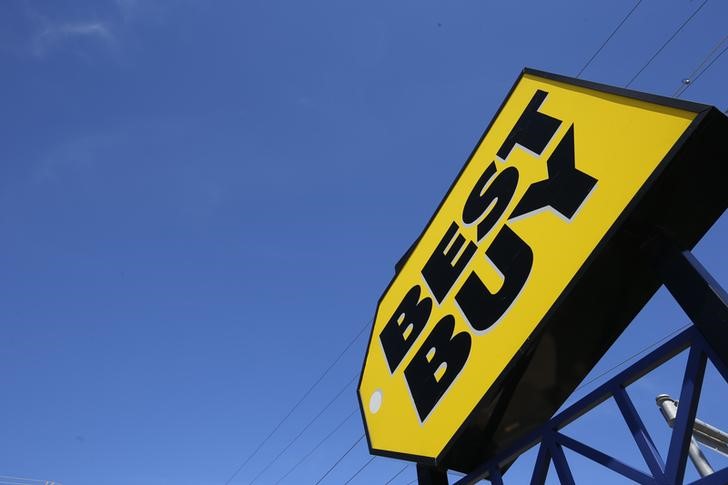Stock market today: S&P 500 drops for fifth day as focus shifts to Powell’s speech
On Thursday, Barclays (LON:BARC) analyst Matthew McClintock maintained an Equalweight rating on Best Buy stock (NYSE:BBY) with a consistent price target of $89.00, aligning closely with InvestingPro’s Fair Value calculation. McClintock’s assessment followed Best Buy’s first-quarter results, which presented a complex picture: sales decreased 4.43% year-over-year, yet earnings per share (EPS) were better than anticipated. Notably, seven analysts have recently revised their earnings estimates upward for the upcoming period. The focus now shifts to Best Buy’s capability to navigate the impact of tariffs and to advance its strategic initiatives, such as the Marketplace platform mentioned in the company’s release.
Best Buy’s Q1 sales did not meet expectations, despite some industry data suggesting a potential increase in consumer purchases and the possibility of positive comparable store sales. The sales trends remained uncertain, affected by specific product categories and broader economic factors, including those related to the housing market. However, the company’s guidance for Q2 sales aligns more closely with market projections, which anticipate a slight downturn. According to InvestingPro data, Best Buy maintains strong fundamentals with a healthy current ratio of 1.03 and operates with moderate debt levels, suggesting resilience during this challenging period.
The company’s Q1 EPS outperformed, reflecting effective management. Additionally, Best Buy has revised its full-year EPS guidance, a move that is expected to be generally well-received by the market, despite previous concerns. This revision takes into account the potential variability in tariffs but does not assume any changes in consumer behavior. McClintock noted that other companies in the sector have not effectively incorporated potential changes in consumer behavior either.
Best Buy’s stock is currently trading at a P/E ratio of 16.68x and offers a significant dividend yield of 5.31%, having maintained dividend payments for 23 consecutive years. According to McClintock, the current valuation seems to reflect a higher degree of tariff risk compared to other companies in the industry. For deeper insights into Best Buy’s valuation and comprehensive financial analysis, investors can access the detailed Pro Research Report available on InvestingPro, which covers over 1,400 top US stocks with expert analysis and actionable intelligence.
In other recent news, Best Buy announced a new $1.25 billion credit facility, replacing an equivalent line set to expire in 2028. This move extends their credit line until April 2030, with terms similar to the previous arrangement. Best Buy also reported mixed results for its first quarter, with a decline in sales but an improvement in earnings per share (EPS). Barclays maintained an Equalweight rating on the stock, citing the company’s challenges with tariffs and strategic initiatives. Meanwhile, DA Davidson adjusted its price target for Best Buy to $95, maintaining a Buy rating, as they noted the company’s resilience amid tariff-related challenges. Benchmark analysts also reiterated a Buy rating with a $110 target, highlighting the positive impact of recent tariff exemptions on consumer electronics. These exemptions, announced by the White House, temporarily remove tariffs on key categories like smartphones and laptops. This development is expected to alleviate some cost pressures for Best Buy, potentially benefiting their cost structure and margins.
This article was generated with the support of AI and reviewed by an editor. For more information see our T&C.
